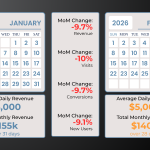
Google Universal Analytics will go offline completely on July 1st, 2024, which means you will no longer be able to view or export your historical data. GA3 users have three options for exporting their data ahead of the sunset:
- Manually export your data using an "export" option in the user interface.
- Use the Google-provided Chrome extension.
- Use the Google Analytics API.

Use the Google Analytics User Interface
The simplest way to export data from Google Universal Analytics before the deprecation date is to log in to the system, navigate to the report you'd like to save, and export it using one of the provided options (CSV, PDF, Sheets, etc). This approach should work for anyone with a small amount of data and basic needs for comparing current trends to historical ones.
- After you export the data, it can be saved locally on your computer or uploaded to a database.
- Data exported to Google Sheets can be connected to Looker Studio and visualized similarly to the native reports in Google Analytics.

Use the Google-Provided Chrome Extension
The Google-provided Chrome Extension is a more robust option for users looking to archive small or medium-sized datasets with more granularity and measurements. This extension is designed to work seamlessly with Google Analytics and Google Sheets.
- The extension offers an intuitive interface, making it accessible to users with varying levels of technical expertise.
- Users can set up automated processes to regularly archive their data without manual intervention, ensuring consistency and reliability.
- The extension allows users to customize their archive settings based on specific parameters, such as date ranges, dimensions, and metrics.
- It's integrated with Google Analytics, ensuring compatibility and reliability.
Users with complex data needs (such as more comprehensive schemas and/or many years of data) may find the process of archiving with the Chrome extension and Google Sheets slow and time consuming.

Use the Google Analytics API
Users with high volumes of website traffic, advanced schema needs, and many years of data should use the Google Analytics API.
- The API offers unparalleled flexibility, allowing users to tailor their archiving processes to meet specific requirements and objectives.
- Users can automate the archiving process and scale it according to the size and complexity of their datasets.
- The API enables users to perform advanced analytics and data processing tasks beyond the capabilities of the standard Google-provided extension.
- It can be seamlessly integrated with other tools, platforms, and systems, allowing for streamlined workflows and enhanced data management capabilities.
To archive data with the Google Analytics API, you will need support from your engineering and development team, or you can choose to self service by selecting an Extract, Transform, and Load (ETL) application that has GA API integration and support for your preferred load destination (such as BigQuery, Snowflake, AWS, etc).

Export Your Google Universal Analytics Data With Launchpad
Launchpad by Calibrate Analytics is an intuitive, zero-code data transfer tool that can extract any dimension or metric from the Google Universal Analytics API.
- Our intuitive help documentation allows you to see the most popular schemas (dimension and metric combinations) that other platform users are downloading. These schemas can be directly imported into your job settings.
- Launchpad will alert you if any of your data exports were sampled (usually because the API request exceeded the system limit) and give you options for reducing the size of your query to meet the GA API system thresholds.
- The Launchpad help section features a variety of SQL examples and tutorials to help you UNION your historical GA UA data with your Google Analytics 4 data.
- Once you have a UNION of your GA UA and GA4 data, you will be able to build rolling charts and period-over-period comparisons in your preferred visualization application.
Need Help?
In less than five months, GA UA will be taken offline forever, and there will be no record of your organization's website history if you do not act quickly. Calibrate Analytics has the technology and expertise to help you successfully export, transform, and visualize your historical GA UA data before the shut off.






